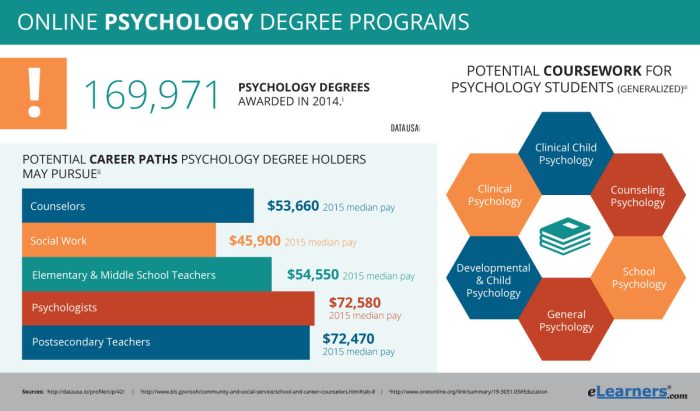Colleges that offer online psychology degrees are opening doors to a world of possibilities for aspiring mental health professionals. The demand for qualified psychologists is on the rise, and an online degree provides a flexible and accessible route to a fulfilling career.
From the comfort of your home, you can delve into the fascinating world of human behavior, exploring diverse areas like clinical psychology, counseling, and industrial-organizational psychology.
Online psychology programs offer a range of benefits, including affordability, flexibility, and a personalized learning experience. With a diverse selection of bachelor’s, master’s, and doctoral programs, you can find the perfect fit for your individual goals and career aspirations. The curriculum is designed to equip you with the necessary knowledge and skills to succeed in a competitive field, preparing you for a variety of career paths.
Introduction
The landscape of higher education is undergoing a significant transformation, with online learning rapidly gaining popularity. This trend is particularly evident in the field of psychology, where the demand for qualified professionals continues to grow. Pursuing an online psychology degree offers numerous advantages, making it an attractive option for individuals seeking to enhance their knowledge and career prospects.
Are you a passionate special education teacher seeking flexible work opportunities? Explore online tutoring jobs for special education teacher. These jobs offer the chance to connect with students from diverse backgrounds, providing individualized support and guidance tailored to their unique learning needs.
The flexibility, affordability, and accessibility of online programs have made them increasingly appealing to a diverse range of students. Online psychology degrees provide a convenient and cost-effective way to acquire a valuable education, regardless of geographical location or personal circumstances.
Types of Online Psychology Degrees
Online psychology degrees are available at various levels, catering to different academic and career aspirations.
- Bachelor’s Degrees:These programs provide a foundational understanding of psychology, covering topics such as human behavior, cognitive processes, and social interactions. Bachelor’s degrees in psychology can lead to entry-level positions in fields like research, counseling, and social work.
- Master’s Degrees:Master’s programs offer specialized knowledge in specific areas of psychology, such as clinical psychology, counseling psychology, or industrial-organizational psychology. These degrees prepare individuals for advanced roles in research, therapy, and organizational consulting.
- Doctoral Degrees:Doctoral programs, such as a Doctor of Philosophy (Ph.D.) or a Doctor of Psychology (Psy.D.), are designed for those seeking to pursue careers in research, teaching, or clinical practice. These programs require rigorous coursework, extensive research, and a dissertation or clinical internship.
Types of Online Psychology Degrees

Online psychology degrees provide a flexible and convenient way to pursue a career in this dynamic field. These programs offer a range of options, from undergraduate to doctoral levels, catering to diverse learning styles and career aspirations.
Bachelor’s in Psychology
A Bachelor of Arts (BA) or Bachelor of Science (BS) in Psychology provides a foundation in the fundamental principles and theories of psychology. It prepares students for entry-level positions in various fields or further graduate studies.
- Core Courses:Introductory Psychology, Research Methods, Statistics, Developmental Psychology, Social Psychology, Abnormal Psychology, and Personality Psychology.
- Electives:Students can choose from a variety of elective courses to specialize in areas such as clinical psychology, counseling psychology, industrial-organizational psychology, or forensic psychology.
Master’s in Psychology
Master’s in Psychology programs delve deeper into specialized areas of psychology, providing advanced knowledge and skills for professional practice or research.
Looking to enhance your knowledge and expertise in nutrition? Consider enrolling in nationally recognised nutrition courses online. These courses provide a comprehensive understanding of dietary principles, food science, and health implications, equipping you with the skills and knowledge to make informed dietary choices and potentially pursue a career in the field.
- Clinical Psychology:Focuses on the diagnosis, treatment, and prevention of mental and emotional disorders.
- Counseling Psychology:Concentrates on providing therapeutic services to individuals, couples, families, and groups dealing with personal, social, and emotional issues.
- Industrial-Organizational Psychology:Applies psychological principles to the workplace, focusing on employee motivation, performance, and organizational effectiveness.
- Forensic Psychology:Integrates psychology with the legal system, examining criminal behavior, witness testimony, and legal decision-making.
Doctoral Degrees in Psychology
Doctoral degrees in Psychology (Ph.D. or Psy.D.) are the highest level of education in the field, preparing students for research, teaching, and independent practice.
- Ph.D. Programs:Emphasize research and scholarly contributions, typically culminating in a dissertation based on original research.
- Psy.D. Programs:Focus on clinical practice and the application of psychological principles to therapeutic interventions.
Accreditation and Quality Assurance
Choosing an online psychology degree program requires careful consideration of its quality and credibility. Accreditation plays a crucial role in ensuring that a program meets rigorous standards and prepares graduates for successful careers. Accredited programs undergo a thorough evaluation process, ensuring that they offer a high-quality educational experience.
Reputable Accrediting Bodies
Several organizations accredit psychology programs, providing a benchmark for quality and credibility. These bodies evaluate programs based on a set of criteria, ensuring that they meet established standards for curriculum, faculty qualifications, and student support services.
- American Psychological Association (APA): The APA is the leading professional organization for psychologists in the United States. Its accreditation process is highly regarded and ensures that programs meet the highest standards for training and education.
- Council for Higher Education Accreditation (CHEA): CHEA is a non-profit organization that recognizes accrediting bodies. Accreditation by a CHEA-recognized body indicates that a program meets high standards of quality and accountability.
- Regional Accrediting Agencies: Regional accrediting agencies, such as the Middle States Commission on Higher Education (MSCHE) and the Western Association of Schools and Colleges (WASC), also accredit colleges and universities, including those offering online psychology programs.
Accreditation Criteria
Accrediting bodies evaluate online psychology programs based on various criteria, ensuring that they provide a comprehensive and rigorous educational experience. These criteria include:
- Faculty Qualifications: Accrediting bodies require that faculty members in online psychology programs hold appropriate credentials, such as doctoral degrees in psychology or related fields. They also assess the faculty’s experience and expertise in teaching and research.
- Curriculum Rigor: The curriculum must be aligned with the principles of psychology and cover essential topics, such as research methods, statistics, developmental psychology, and abnormal psychology. Programs should also offer opportunities for students to engage in practical experiences, such as internships or research projects.
- Student Support Services: Accrediting bodies evaluate the availability and quality of student support services, such as academic advising, career counseling, and technical support. These services are essential for ensuring that students have the resources they need to succeed in their online studies.
- Technology and Infrastructure: Online psychology programs must have robust technological infrastructure, including secure learning management systems, reliable internet connectivity, and access to relevant software and resources. Accrediting bodies evaluate the quality and accessibility of these technological components.
Choosing the Right Online Program

Selecting the ideal online psychology program requires careful consideration of several factors. This section will guide you through key aspects to evaluate, ensuring you make an informed decision that aligns with your academic and career goals.
Key Factors to Consider
When choosing an online psychology program, it is crucial to assess various aspects to ensure a rewarding and enriching learning experience.
- Program Reputation: Research the program’s standing within the field of psychology. Look for accreditation from reputable organizations like the American Psychological Association (APA) or the Council for Higher Education Accreditation (CHEA). Reputable programs often have strong alumni networks and positive reviews from past students.
- Faculty Expertise: Explore the qualifications and experience of the program’s faculty. Look for professors with extensive research backgrounds, publications in peer-reviewed journals, and practical experience in their areas of specialization.
- Curriculum Relevance: Evaluate the curriculum’s alignment with your career aspirations. Consider whether the program offers courses relevant to your specific interests, such as clinical psychology, counseling, or research.
- Student Support Services: Inquire about the program’s student support services, such as academic advising, career counseling, and technical assistance. These resources can significantly enhance your learning journey.
- Flexibility and Convenience: Assess the program’s flexibility in terms of course scheduling, delivery methods, and access to learning materials. Consider factors like the program’s availability, course formats (live sessions, asynchronous learning), and technological requirements.
- Cost and Financial Aid: Compare tuition fees, program costs, and available financial aid options. Consider factors like scholarship opportunities, payment plans, and potential return on investment.
Program Types
Online psychology programs are offered in various formats, each with its own advantages and disadvantages.
| Program Type | Pros | Cons |
|---|---|---|
| Traditional Online Programs |
|
|
| Blended Learning Programs |
|
|
| Self-Paced Programs |
|
|
Reputable Colleges and Universities
Several reputable colleges and universities offer high-quality online psychology degrees.
- Arizona State University: Offers a wide range of online psychology degrees, including bachelor’s, master’s, and doctoral programs. The university is known for its innovative online learning platform and its commitment to student success.
- University of Southern California: USC’s online psychology programs are highly regarded for their academic rigor and faculty expertise. The university offers a variety of specialization options, including clinical psychology, counseling, and organizational psychology.
- Purdue University Global: Purdue Global provides flexible and affordable online psychology degrees. The university’s programs are designed to meet the needs of working professionals and students seeking to advance their careers.
- Capella University: Capella University is a well-established online university that offers a variety of psychology programs, including bachelor’s, master’s, and doctoral degrees. The university’s programs are known for their focus on practical application and real-world relevance.
- Walden University: Walden University is a leader in online education, offering a wide range of psychology programs. The university’s programs are designed to be accessible and affordable, with a focus on social justice and human well-being.
Career Paths and Job Prospects
An online psychology degree opens doors to a wide range of career paths, offering diverse opportunities in various settings. Graduates can pursue fulfilling careers in clinical settings, research institutions, educational institutions, and corporate environments. Understanding the job market trends and licensing requirements is crucial for aspiring psychology professionals.
Career Options for Psychology Graduates
The field of psychology offers a wide array of career options, catering to diverse interests and skill sets. Graduates with online psychology degrees can explore various avenues, including:
- Clinical Psychology:Clinical psychologists provide assessment, diagnosis, and treatment for mental, emotional, and behavioral disorders. They work in hospitals, clinics, private practices, and community mental health centers.
- Counseling Psychology:Counseling psychologists focus on helping individuals cope with personal and interpersonal challenges. They work in schools, universities, private practices, and community organizations.
- School Psychology:School psychologists work in educational settings, providing psychological services to students, teachers, and parents. They conduct assessments, develop interventions, and provide counseling support.
- Industrial-Organizational Psychology:Industrial-organizational (I/O) psychologists apply psychological principles to the workplace. They conduct research, design training programs, and advise organizations on issues related to employee motivation, performance, and well-being.
- Forensic Psychology:Forensic psychologists apply psychological principles to legal settings. They provide expert testimony, conduct psychological evaluations, and consult on criminal investigations.
- Research Psychology:Research psychologists conduct scientific studies to understand human behavior, cognition, and development. They work in universities, research institutions, and government agencies.
- Health Psychology:Health psychologists focus on the psychological aspects of health and illness. They work in hospitals, clinics, and community health centers, promoting healthy behaviors and providing support to patients.
Job Market for Psychology Professionals
The job market for psychology professionals is dynamic and evolving. The demand for qualified psychologists varies depending on the specialization and geographic location. According to the U.S. Bureau of Labor Statistics, employment of psychologists is projected to grow by 14% from 2020 to 2030, faster than the average for all occupations.
- Growing Demand:The increasing awareness of mental health issues and the growing aging population contribute to the demand for psychologists.
- Specialized Fields:Specific areas of psychology, such as health psychology and geriatric psychology, are experiencing significant growth due to the rising prevalence of chronic diseases and the aging population.
- Technological Advancements:The integration of technology in mental health services, such as telehealth and online therapy, is creating new opportunities for psychologists.
Licensing Requirements for Psychology Professionals, Colleges that offer online psychology degrees
To practice psychology independently in most states, professionals need to obtain a license. Licensing requirements vary from state to state, but generally involve the following:
- Educational Requirements:A doctoral degree (Ph.D. or Psy.D.) in psychology is typically required for licensure.
- Supervised Experience:Postdoctoral training, typically involving 1-2 years of supervised experience in a clinical setting, is required.
- Examination:Candidates must pass the Examination for Professional Practice in Psychology (EPPP) or a similar licensing exam.
- Continuing Education:Licensed psychologists are required to complete continuing education units (CEUs) to maintain their licenses.
It is essential for aspiring psychologists to research the specific licensing requirements in the state where they plan to practice.
Tips for Success in Online Learning
Succeeding in an online psychology program requires a proactive approach and a commitment to effective learning strategies. This section Artikels essential tips to enhance your learning experience and maximize your chances of success.
Time Management and Organization
Effective time management is crucial for online learning. It involves creating a structured schedule that allocates sufficient time for coursework, assignments, and participation in discussions.
- Create a Weekly Schedule:Dedicate specific days and times for online learning, including reading materials, completing assignments, and participating in discussions.
- Break Down Tasks:Divide large assignments into smaller, manageable chunks to prevent overwhelm and promote progress.
- Use a Calendar or Planner:Utilize a calendar or planner to track deadlines, meetings, and other important events.
- Avoid Procrastination:Set realistic deadlines for yourself and resist the temptation to postpone tasks.
Active Participation and Effective Communication
Engaging actively in online discussions and communicating effectively with instructors and peers is essential for a successful learning experience.
- Participate in Discussions:Contribute meaningfully to online discussions, sharing insights and perspectives while responding to your classmates’ posts.
- Communicate Clearly and Respectfully:Use clear and concise language in your written communication, ensuring that your messages are respectful and appropriate for an academic setting.
- Seek Clarification When Needed:Do not hesitate to ask questions if you are unclear about any concepts or instructions.
- Respond Promptly to Messages:Make an effort to respond to messages from instructors and peers in a timely manner.
Creating a Conducive Learning Environment
Establishing a dedicated workspace and minimizing distractions can significantly enhance your online learning experience.
- Set Up a Dedicated Workspace:Choose a quiet and well-lit area in your home where you can focus on your studies without interruptions.
- Minimize Distractions:Turn off notifications on your phone and computer, and avoid engaging in other activities while studying.
- Ensure a Comfortable Workspace:Invest in a comfortable chair, desk, and lighting to create a conducive learning environment.
- Limit Social Media Use:Reduce or eliminate social media use during dedicated study time to enhance focus and productivity.
Staying Motivated and Engaged
Maintaining motivation and engagement is crucial for success in online learning.
- Set Goals and Celebrate Milestones:Establish clear goals for each course and celebrate your progress along the way.
- Seek Out Opportunities for Professional Development:Explore relevant conferences, workshops, or online courses to expand your knowledge and skills.
- Connect with Peers:Engage with your classmates through online forums or study groups to foster a sense of community and support.
- Remember Your Goals:Remind yourself regularly of your reasons for pursuing an online psychology degree and the career opportunities it will open up.
Final Wrap-Up: Colleges That Offer Online Psychology Degrees
Pursuing an online psychology degree can be a transformative journey, empowering you with the knowledge and skills to make a positive impact on the lives of others. As you navigate the world of online learning, remember to leverage the resources available to you, stay focused, and embrace the challenges as opportunities for growth.
With dedication and passion, you can achieve your goals and contribute to the field of psychology in meaningful ways.
